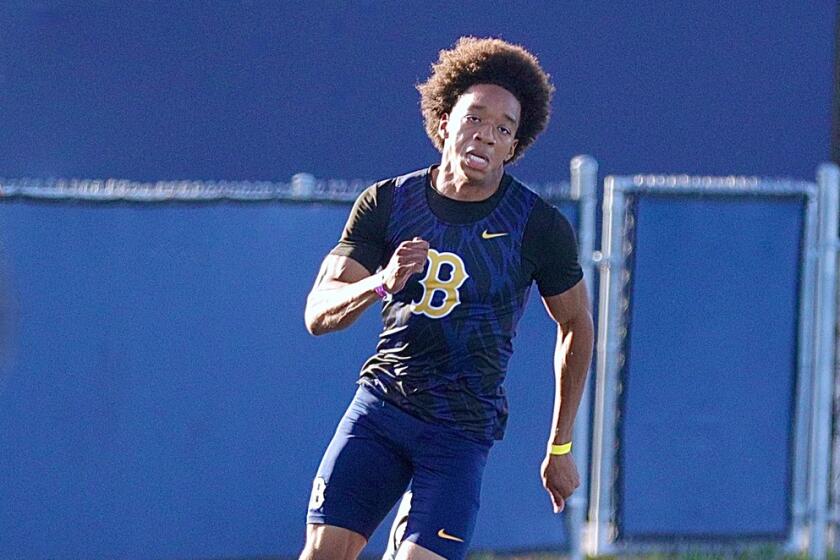PREP WEDNESDAY : Finding the Right Diet Can Be a Balancing Act
- Share via
In the August issue of California Football magazine, advertisements for weight-gain formulas abound.
One ad, which promotes a predigested, nutrient-dense formula, features a bare-chested hulk of a man, biceps bulging, face grimacing, readying himself to bench press what appears to be a very heavy amount of metal.
The caption reads: “Because you have to be big before you can be awesome.”
If size and strength are important to football players--and many say they are--then what do high school players eat once they have left the weight room and practice field?
Some take supplements such as amino acids and protein powders, which help to build muscle tissue. Others rely on good ol’ home cooking. Some live almost solely on fast foods.
Which is the best way? It depends on who you talk to.
“There’s nothing I won’t eat,” said Esperanza tackle Matt Werner, who is 6-feet 5-inches and 243 pounds. “(Though) I try to get as much carbohydrates as I can.”
Wade Hogg, a 6-6, 270-pound Troy lineman, eats all the time, according to his mother, Diane.
“My mom keeps me going on carbohydrates,” Hogg said. “She keeps feeding me spaghetti and pasta all the time. And a lot of vitamins.
“I try to stick to a diet of good foods, lots of nutrition. But after games, Del Taco looks mighty inviting.”
Most doctors and nutritionists agree that for the most part, a balanced diet--including energy-rich complex carbohydrates such as whole grains, pasta and potatoes--is enough to fuel the average high-school football player.
But what about the player who wants to gain weight?
First, heredity plays a big part, according to many doctors.
Hogg was 9-pounds 11-ounces at birth. His father is 6-4, 250.
Genetics also play an important role in how and where weight is placed when gained.
Dr. Jackie Puhl, professor of nutrition at the University of Texas, said that just because an athlete takes in an abundance of calories, that doesn’t mean the end result will be more muscle.
“Dumping all that food in may increase body weight, but it won’t necessarily increase muscle mass,” Puhl said. “Because of an individual’s genetic makeup, one athlete may be able to eat (an abundance of calories) and gain muscle mass easily, where another will eat and lay down fat instead.”
Doctors also point out that an increased intake of protein--whether it’s foods (meats, poultry, eggs) or supplements (amino acids, protein powders)--does not necessarily add more muscle mass.
“The kid who’s 140, 150 pounds, and who’s trying to put on weight . . . usually has plenty of protein in his diet,” said Dr. Mel Williams, director of the Human Performance Laboratory at Old Dominion University.
“Some research has suggested that a slight increase is beneficial, maybe up to 18-20% of the total diet, but no one has really shown that increased protein intake straight out builds muscle mass.”
Many doctors and nutritionists say that eating vast amounts of protein--which is becoming easier to do with taking over-the-counter supplements--can be harmful to the body, because metabolizing large amounts of protein places a greater strain on the kidneys.
Also, much of the foods high in protein--steak, eggs, whole milk and cheese--are high in fat and cholesterol. Some doctors are concerned that athletes trying to bulk up with these foods are setting poor eating patterns for their future.
“From a nutritional standpoint, taking in too much fat and cholesterol is not good in the first place as it can lead to arteriosclerosis,” Puhl said. “But from a risk standpoint, eating these types of things, especially in large quantities, optimizes any risk that’s already there.”
So what’s a player to do if he wants to gain weight, namely in the form of muscle mass?
“Everyone’s always looking for the magical answer,” Williams said. “But basically we have to teach the kids to stick with basic nutrition, stay away from junk foods, and go with a good strength training program.”
“They have to get serious about that (training program) first, and then let them worry about a good solid diet.”
More to Read
Go beyond the scoreboard
Get the latest on L.A.'s teams in the daily Sports Report newsletter.
You may occasionally receive promotional content from the Los Angeles Times.










